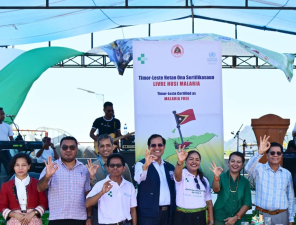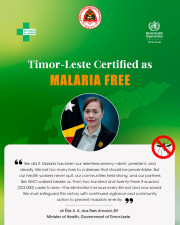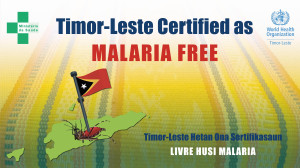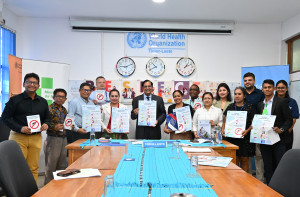Timor-Leste Recognized by WHO as Malaria-Free Country

On July 24th, 2025, the World Health Organization (WHO) officially certified Timor-Leste as malaria-free country, recognizing the country's more than two-decade-long effort to eliminate one of the most deadly and persistent tropical diseases. With this certification, Timor-Leste becomes the third country in the WHO Southeast Asia region to achieve this feat, after the Maldives and Sri Lanka, and marks its second malaria elimination in less than two years, following the 2024 recognition of the elimination of lymphatic filariasis.

The Prime Minister Kay Rala Xanana Gusmão said that "this victory belongs to our tireless health professionals and to each family that invested in prevention. For over 20 years, we have fought village by village, family by family. This proves that not even the most lethal diseases can withstand the determination of the Timorese people.
The Minister of Health, Élia António de Araújo dos Reis Amaral emphasized that malaria has been one of the greatest public health challenges in Timor-Leste for decades. "We have lost many lives to a disease that should have been preventable. But our professionals never gave up, our communities remained steadfast, and our partners, like the WHO, have always stood by us. Eliminating malaria honors every life lost and every life now protected. It is now up to us to maintain this achievement with continued vigilance and community action,’ she declared. 
The WHO certification confirms that the country has managed to sustainably interrupt indigenous malaria transmission for at least three consecutive years. In 2006, Timor-Leste recorded more than 223,000 cases of malaria, having managed to reduce that number to zero indigenous cases as of 2021. This result is particularly remarkable considering the country's tropical and mountainous conditions, which favor the proliferation of the mosquito that transmits the disease.
According to the WHO Representative in Timor-Leste, Arvind Mathur, this is "an exemplary national triumph, sustained by determined leadership, the tireless work of health professionals, and the courage of communities. Timor-Leste stood firm—testing, treating, and investigating rapidly. Ending transmission and maintaining zero deaths require more than science; it requires resilience.
The Global Fund, which has supported Timor-Leste since 2003, also welcomed the achievement and committed to continue supporting the country until 2026, through targeted investments to prevent the reintroduction of malaria, strengthen health systems and support community workers. 
The WHO recognition was preceded by several assessment missions conducted between 2023 and 2025, which confirmed the absence of indigenous transmission and the robustness of the national epidemiological surveillance system. This achievement was also highlighted by the APMEN (Asia Pacific Malaria Elimination Network), which considered the certification a regional milestone and an inspiration for other countries in the Pacific and South Asia.
Timor-Leste will continue, in the coming years, to implement the National Plan for the Prevention of the Reintroduction of Malaria (2021–2025) and the National Plan for Vector-Borne Diseases (2021–2030), promoting the integration of malaria services with other public health programs and strengthening cross-border collaboration, particularly with Indonesia.










































